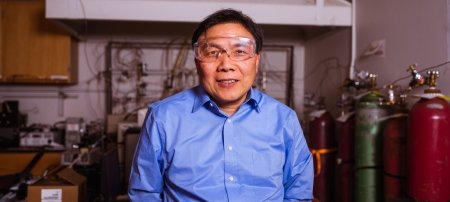Michigan Technological University has received $2.8 million from the US Department of Energy (DOE) to develop next-generation control systems for light-duty hybrid electric vehicles. Tech is one of three Michigan recipients of a total of $8.5 million in new grants from DOE’s Advanced Research Projects Agency-Energy (ARPA-E).
Nationwide, 10 projects received $32 million in funding through ARPA-E’s newest program, NEXT-Generation Energy Technologies for Connected and Automated on-Road-vehicles (NEXTCAR). NEXTCAR’s mission is to create new control technologies that reduce the energy consumption of future vehicles by using connectivity and vehicle automation. Connected and automated technology utilizes on-board or cloud-based sensors, data and computational capabilities to help a vehicle better process and react to its surrounding environment.
The Michigan Tech team, in partnership with General Motors, will work to reduce the energy consumption by 20 percent in automotive electrified vehicles, including hybrid electric, plug-in hybrid, extended range and fully electric. The project, titled “Connected and Automated Control for Vehicle Dynamics and Powertrain Operation on a Light-Duty Multi-Mode Plug-in Hybrid Electric Vehicle”—will integrate advanced controls with connected and automated vehicle functions, enabling eco-routing and vehicle cooperative driving, says Jeff Naber, Ronald and Elaine Starr Professor of Energy Systems in Tech’s Department of Mechanical Engineering-Engineering Mechanics and principal investigator on the project.
Reducing Greenhouse Gases
“Reducing energy consumption reduces fuel and electrical energy needs, extends the vehicle’s range and reduces greenhouse gases,” Naber explains.
The technology will be tested on a fleet of vehicles provided through the GM partnership, using Michigan Tech’s mobile laboratory as a mobile computing and communications center.
“We are honored that the Department of Energy’s ARPA-E program recognizes the quality of automotive and energy conservation research that is going on at Michigan Tech and turned to our experts to conduct this project,” said President Glenn Mroz. “Their findings promise to be of great benefit to the future of our state and nation.”
New Energy Technologies
ARPA-E was established to advance high-potential, high-impact energy technologies that are too early for private-sector investment. ARPA-E awardees are unique because they are developing entirely new ways to generate, store and use energy.
"Michigan Tech was well positioned for the NEXTCAR program with our rich successful history of support from government and industry in hybrid electric vehicles and light-, medium-, and heavy-duty vehicles," says Bill Predebon, chair of the Department of Mechanical Engineering-Engineering Mechanics. "Jeff Naber put together a talented interdisciplinary team from several Michigan Tech departments and with major support from General Motors. This is a significant accomplishment by the faculty."
Contributing to the Michigan Tech project are Bo Chen, Chris Morgan, Chris Pinnow, Darrell Robinette, Mahdi Shahbakhti, Jeremy Worm and Kuilin Zhang; also Marlene Lappeus and Jennifer Bukovich in the proposal development and submission
Michigan Technological University is an R1 public research university founded in 1885 in Houghton, and is home to nearly 7,500 students from more than 60 countries around the world. Consistently ranked among the best universities in the country for return on investment, Michigan's flagship technological university offers more than 185 undergraduate and graduate degree programs in science and technology, engineering, computing, forestry, business, health professions, humanities, mathematics, social sciences, and the arts. The rural campus is situated just miles from Lake Superior in Michigan's Upper Peninsula, offering year-round opportunities for outdoor adventure.






Comments